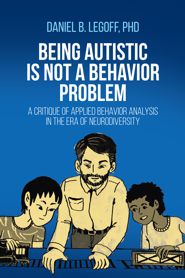
Being Autistic is Not a Behavior Problem
A Critique of Applied Behavior Analysis in the Era of Neurodiversity
by Daniel B. LeGoff, PhD
- Number of Pages: 498
- ISBN-10: 1627344373
- ISBN-13: 9781627344371
- Publisher: Universal-Publishers
- Year: 2023
- Category: Psychology,
Synopsis
Applied behavior analysis (ABA) has become a widely used form of therapy for autistic children without its theories and methods being well understood. This critical analysis of the theories and research on which ABA bases its claim to being an evidence-based treatment is a must-read for everyone who has a stake in the lives of autistic individuals. This book reviews the literature which shows that ABA is not based on scientific research, and that practitioners of ABA are not required to be trained in child psychology, pediatrics, child development, education, family therapy, language development, or scientific research. ABA is not based on any form of developmental science, but primarily on the works of B.F. Skinner whose ideas were first published over seventy years ago. This philosophical viewpoint, radical behaviorism, holds that individual experiences are irrelevant to behavior change because the determining factors of our actions are in the environment; the rewards and punishments that result from those actions. This in-depth analysis of the theories and research of ABA leads to the conclusion that ABA is not an applied science, nor does it promote values consistent with current models of child development and education. Other promising methods based on modern science, including parent-directed early infancy pre-emptive strategies and peer-based LEGO Clubs, also discussed here, are often overshadowed by the media coverage and marketing strategies of ABA-based autism services, despite these messages being overstated and misleading. Simply put, the public trust and investment in ABA services needs to be reviewed in greater detail, and with greater skepticism.The pseudoscientific concepts described by behavior analysts sound convincing to many, but upon closer examination amount to little more than what most educators and parents typically do already, and at the same time, involve costly and invasive services with little or no evidence of meaningful benefit. Some natural strategies such as peer-mentoring and caregiver training do help autistic children and their families to adapt to mainstream settings, the persistent promise of evidence-based autism treatment, has generated an expanding market for ABA services which actually interferes with typical social development.
Modern views of child development, social and cultural adaptability, play, and education emphasize integration of individuals and their sociocultural environments. Less costly, proactive, and non-invasive approaches to improving social adaptability and quality of life for autistic children and their caregivers are currently available, but unlike ABA-based services, they are not widely promoted in the public media or offered directly to families by thousands of newly certified providers. A science-based and holistic understanding of the life experiences of autistic individuals recognizes the importance of sociocultural adjustment and long-term quality of life, not behavioral compliance in adult-controlled settings, even when those settings are described as naturalistic. Radical behaviorism was not and will never be compatible with developmental models which view development as a reciprocal and dynamic synergistic process, not the outcome of a successful behavior plan. It is important for those who care about diversity in society to promote the creative contributions of individuals with diverse life experiences and to stop thinking about being different as a behavior problem.
WORDS OF PRAISE
This is a uniquely valuable book.... It clearly fills an important gap for parents, clinicians/educators, and policy makers.
--Professor Simon Baron-Cohen, FBA FMedSci; Kt Fellow, Trinity College, Cambridge; Director, Autism Research Centre Psychiatry Department
[Y]ou make compelling cases for your arguments.... [An] excellent and important contribution.
--Andrew Whitehouse, PhD, Angela Wright Bennett Chair in Autism at The University of Western Australia; President, Australian Society for Autism Research
This is indeed a major step.... I am very happy to learn that theoretical ideas of Bernstein... become useful in applied fields such as motor learning and development in atypically developing persons including those with autism.
--Mark Latash, PhD, Distinguished Professor of Kinesiology, Pennsylvania State University
This is a great achievement.
--Artin Goncu, Ph.D, Professor Emeritus, University of Illinois at Chicago






 View or Post a Review at Amazon.com
View or Post a Review at Amazon.com